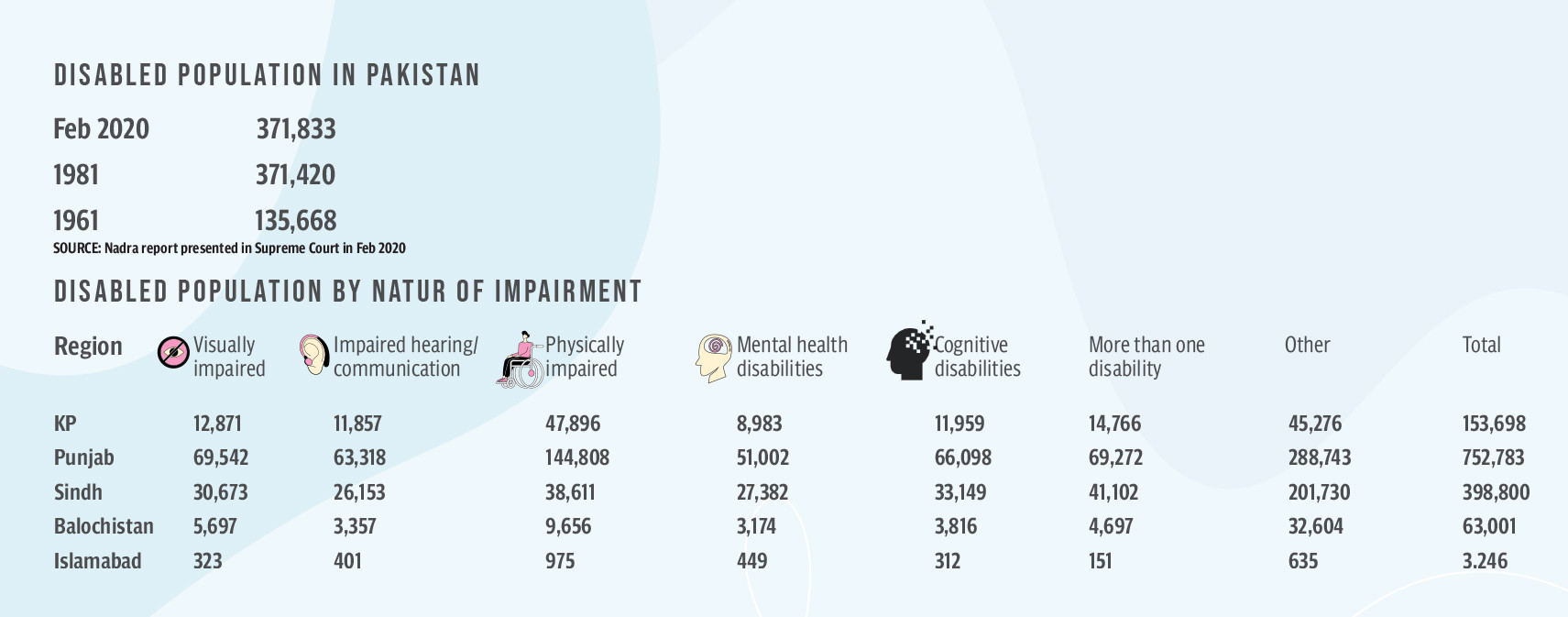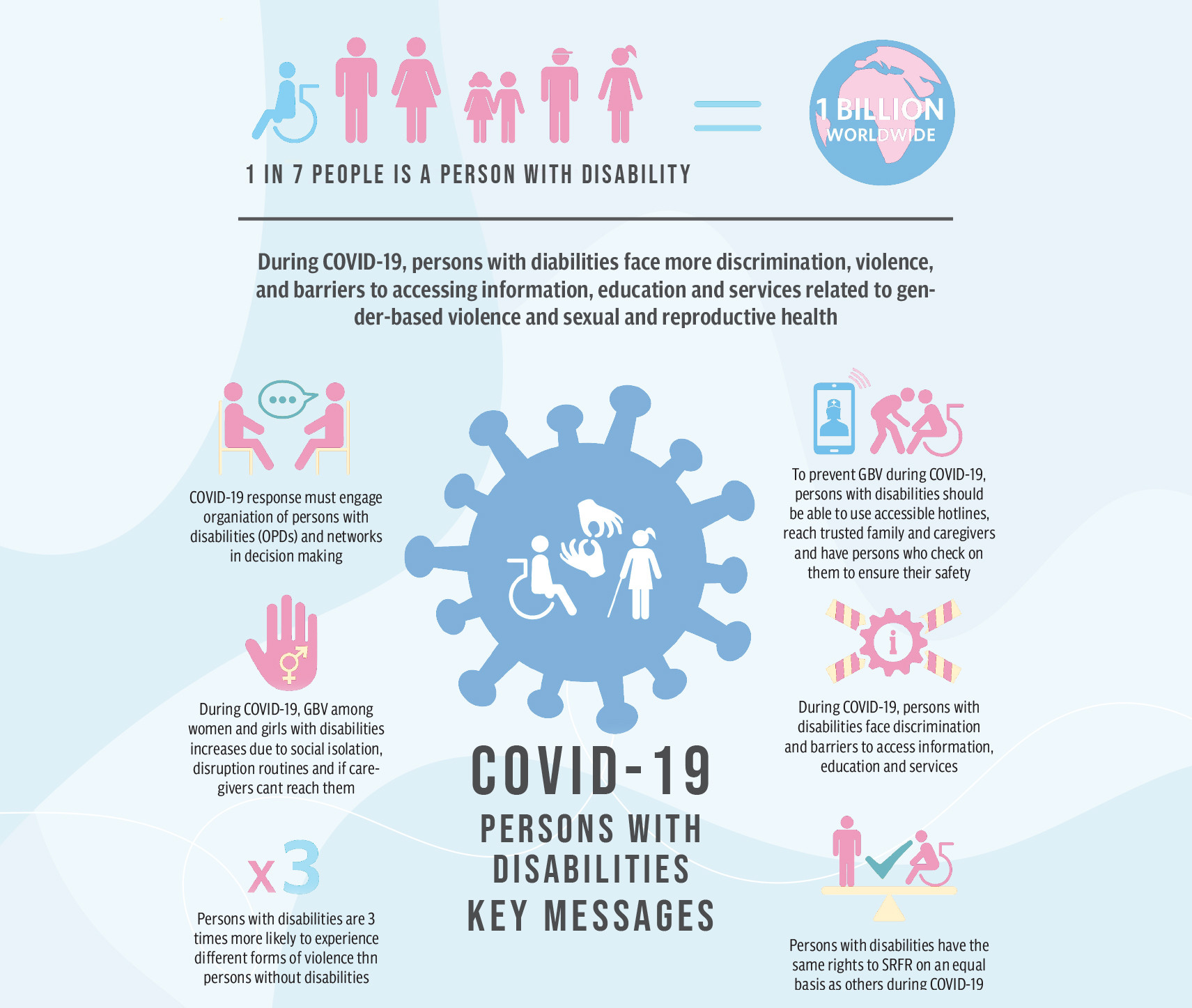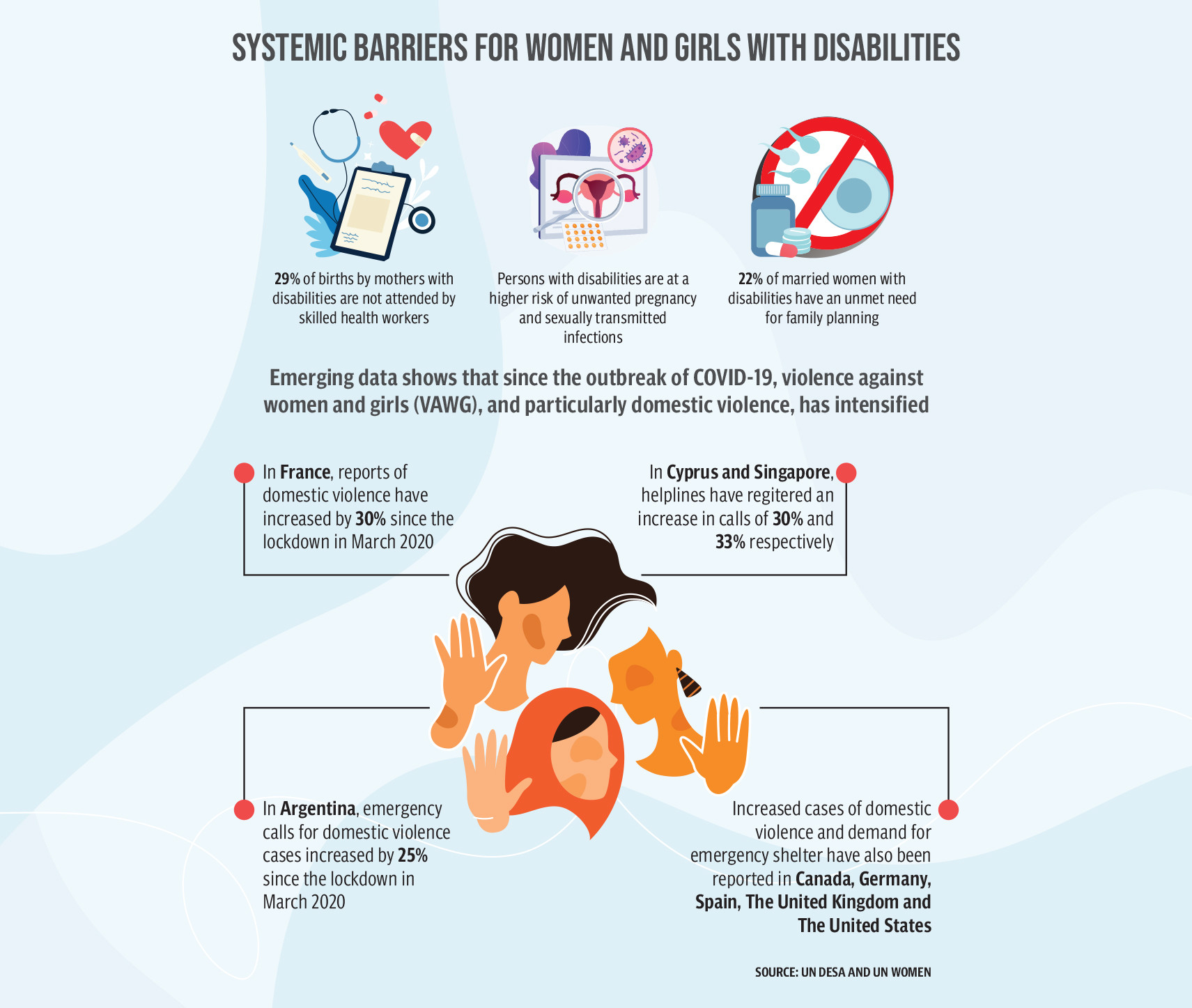While persons with disabilities have always been part of our society, they have struggled to create space for themselves in the system. As a result, they are not always accepted or integrated into mainstream society.
Women with disabilities in particular are often considered a burden. They not only suffer from disabilities but also struggle with accessing education and employment opportunities. Options for marriage for this group are few since they struggle to achieve social acceptance. Gendered discrimination is widespread but there is little being done by the state and development sector to address challenges faced by women with disabilities.
“Women with disabilities are either restricted in homes for life or considered only worthy of charity. No one thinks we can live a normal life like all,” said Abia Akram, a 40-year-old born with the genetic form of rickets, a rare disease that causes the softening and weakening of bones.
Akram has been working to forward the rights of persons with disabilities for last 20 years as the CEO of the National Forum of Women with Disability (STEP). Akram explained that there is a common concept in our society that people will be rewarded by Allah for helping people with disabilities. She said this population is considered worthy of charity, but Akram argues what they really need is inclusion in mainstream society.
Akram said the motivation for her work promoting rights of women with disabilities was the death of her disabled classmate. “When I investigated reason [for] his early death, I came to know that he was not drinking and eating just to avoid going to [the] washroom because he was dependent upon his parents to take him to the washroom,” she said. “After all, how many times a day a disabled person can ask his mother to take him to the bathroom?”
After this incident, Akram said she felt awareness about the struggles of disabled people should be more widespread in Pakistani society. Beyond this, she said she wants to advocate for job opportunities and social inclusion for these members of society.
Maria’s story

Twenty-seven years ago, Maria Qureshi was perfectly healthy until she felt a pain in her spinal cord that turned into a disability that would keep her wheelchair-bound for life. At the time, Qureshi was still a student, diligent and energetic, when she was diagnosed with a rare bone disease that left her completely dependent on others. “It was no less than a nightmare for me, which took many years to bring myself out [of],” Qureshi said.
After Qureshi’s disability took effect, her mother and brother dedicated their time to helping her heal her recover from the experience of losing her mobility. Qureshi said one of her brothers even left his job to help with this process, since his presence was crucial for her treatment. “It was not only me, but my family too was in a state of trauma. They were not only putting efforts to avail every possible medical treatment, which could lead to my recovery but also to bring me out of trauma,” she said.
Qureshi’s family took her to numerous medical facilities and used all available resources to try to get her to recover but found her disease wasn’t curable. Qureshi said after she became disabled, she stopped meeting friends and relatives because she couldn’t bear their sympathy after they had known her in her previous life. Their disappointing questions to her parents were painful.
Qureshi said people began asking what she’d be able to do with her disability, lamenting on the fact that she’d be dependent on family for the rest of her life. “Such remarks were killing me from inside,” she said. Qureshi said she finally started healing when she moved from Lahore from Sialkot, where she started meeting new people and interacting with them. Today, she is managing her personal affairs by herself and has become financially independent.
Obstacles for marriage
When she began working, Qureshi said people used to talk to her about the importance of marriage She also started thinking about this option but felt people were only interested in friendship because of her disability. She felt that even disabled men would prefer marrying an able-bodied woman.
In general, Qureshi said women with disabilities face more obstacles when searching for life partners than men with disabilities. She believes women with these physical setbacks are often excluded from family discussions on marriage-related affairs.
Qureshi said men in Pakistani society enjoy developing friendships with disabled women but don’t pursue long-term relationships with them because they have a vision of a perfect woman that doesn’t match up. Parents are also influenced by this idea, and believe their daughters are incapable of having a successful marriage or having babies, despite knowing her reproductive system is working normally.
“A disabled girl can live a healthy married life. This was what we were hearing after entering the professional life. However, parents avoid discussing marriage-related affairs in the presence of their disabled daughters,” said Yusra Gilani, who is restricted to a wheelchair because of a rare disease. Gilani said parents of disabled women are influenced by misconceptions about disabilities that play into these behaviours.

“No one talks about women's disability in our country. They become a burden on their families due to lack of facilities. They are also subjected to sexual harassment. They are rejected because of their physical structure. It is also said that in case of marriage of such women, their children may also be disabled,” Gilani said.
“If a disabled woman is able to find her life partner, she has to compromise many of her desires in her married life. She suffers greater emotional and physical abuse when in relationship because neither husband nor in-laws give respect which they readily give to a normal girl, instead see her as burden.” Gilani said one misconception people hold about disabled women is that they are not capable of reproducing. She emphasized that physical disabilities don’t equate to reproductive disabilities.
Reproduction myths
It’s not just outsiders who treat disabled women differently, family members also struggle to maintain a sense of normality with their disabled kin. Dr. Umme Habiba, an obstetrician at Valley Clinic in Rawalpindi said many disabled women are not given the right to marry. In general, she said they are severely limited by society in their choice of a partner.
Habiba said she often encounters parents who bring their disabled daughters in for a checkup to see if her reproductive system is normal. In such cases, Habiba said 90 percent of women are found to have normal reproductive systems, while only 10 percent have abnormalities.
Just because a woman is restricted to a wheelchair or is blind, deaf or dumb, that doesn’t mean her reproductive health is compromised because God created different organs in the human body with different functions. “If a girl has normal periods, it means she is able to carry out her other life affairs normally. She can reproduce children also,” she said.
There are some rare diseases, including Down syndrome, that cause chromosomal abnormalities in the human body and may affect reproduction, but parents of children born with such abnormalities are informed at an early stage, she said. Children suffering from chromosomal abnormalities hold low intellectual levels, different colored or unusually shaped eyes, ear abnormalities, brittle or sparse hair, white patches of hair, or differently shaped tongues. Still, medical research shows that there is even a category of Down syndrome in which the person has reproductive capabilities.
Chromosomal patients with an improper uterus have compromised reproductive capabilities. But this rare abnormality is diagnosed in one or two cases maximum out of an estimated 2,000 patients of chromosomal abnormalities.
Habiba said society puts certain limits on disabled women because people believe if one capability of a person is compromised then every ability is compromised. People believe that disabled women can neither live normal lives nor produce children, which gives them the impression that she is a burden, she added.
Despite the misconceptions Habiba encounters in her practice, she said she has seen many examples of disabled women as successful parents. “I would say girls with disabilities proved to be strong mothers because they have gone through tough times and they never allow their children to come across any kind of deficiency in their education,” she said.
Zahid Abdullah, a commissioner working for the rights of persons with disabilities at the Pakistan Information Commission said society expects disabled women to perform the same gender roles of any woman. Society treats women with disabilities as asexual but still applies the same family honor code to them as they do with non-disabled counterparts. Abdullah said this is one of the reasons why women with disabilities face additional barriers.
Abdullah said it is pertinent to understand the social environments in which disabled women fight for rights within their daily existence. She said misunderstanding stems from the fatalistic perspective of society, in which most people lack an appreciation of science and the ability to think rationally.
As a result, Abdullah said people rely on outdated notions and judgments, which perpetuates myths about disabilities. Societies have not learned that disabilities aren’t within a person but their physical and social environments, where obstacles are shaped by the non-disabled majority, he argues. “If we remove those barriers women with disabilitiescan become functionally active and productive citizen for this society as well as the country.”
Disabled and victimized
According to disability rights activists, very few disabled women have the chance to openly pursue marriage because of the various overlapping challenges that dominate their lives. In the worst cases, disabled women who go forward with marriage are at risk of abuse of risk by husbands who torture them mentally because of their physical restrictions or seek second marriages.
They cite examples of disabled women who have accepted marriage proposals from questionable matches because they don’t believe they’d be able to find anyone else to marry them. In such situations, disabled women are abused as income-generating machines, with husbands reaping profits from their labor as domestic workers. In such cases, women are afraid to speak out about their marital conditions because they fear it will further complicate their relationship with their partner, which could lead to divorce. Living within these conditions, many women with disabilities aren’t treated as human beings with desires for a happy married life, but are abused, manipulated, or ignored.
Polio affected Dr. Asma (name has been changed for her safety) who serves in a government-run hospital as regular employee and left her disabled. Despite her qualification and financial independence, she accepted marriage proposal of a low-grade employee because she feared nobody would agree to marry her because of her disabilities. Despite the financial support she provides him, Asma’s husband began to emotionally abuse her a few months into marriage. He even brough a second wife to come and live with them.

Asma is not taken to social events or gatherings with her spouse and spends most of her time confined to her room. Although she is suffering, Asma does not allow her friends to take the matter up with her husband. She doesn’t discuss her humiliation with those closest to her because she fears the consequences of her husband finding out. As a result, she endures near constant mental torture in a dysfunctional marriage.
The Way Forward
There are few examples of disabled women living happy married lives and spreading awareness about the barriers they face in relationships can help, said Gilani. Additionally, intervention from the state is needed to address these challenges at a higher level. There is no policy at the state level addressing rights for women with disabilities and few organization are working for the rights and development of girls with disabilities, which Gilani said needs to change.
She said women with disabilities should be encouraged to pursue marriage, but this requires parents and civil society to be supportive of this option. Gilani argues marriage is a basic human right that shouldn’t be denied to anyone, regardless of their physical state. People with physical conditions have feelings, desires, and aspirations like anyone else, and these things should be respected.
Gilani said the biggest misconception that needs to be overcome is the idea that people with disabilities are incapable of integrating into the mainstream. Many people do not understand the nature and impact of disability on individuals or their surroundings. However, Gilani said medical science has already proven that many of our perceptions, misconceptions and prejudices about disabilities are ill-founded. As a result, there is a pressing need for the state and community stakeholders to work in tandem to challenge the social and cultural stigma attached to disability in our society.
Shazia Mehboob Tanoli is an investigative journalist based in Islamabad. She tweets @shizrehman. All information and facts provided are the sole responsibility of the writer
